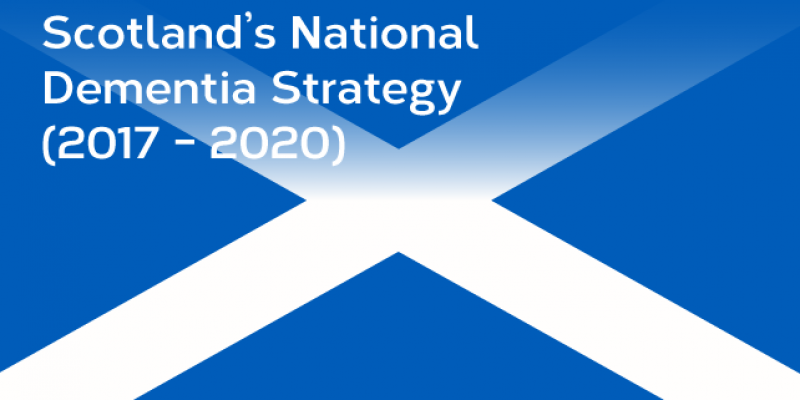
It is 10 years since the Scottish Government made dementia a national priority.
A lot has changed in this time, with a number of significant developments in policy, practice and legislation which have driven improvements in the care and support for people with dementia, their families and carers. In that time, we have seen:
- The Charter of Rights for People with Dementia (2009) become the basis on which dementia policy and practice in Scotland is based.
- Three dementia strategies (2010-13, 2013-16 and 2017-20) which have provided a strategic driver to change the way in which people with dementia are supported.
- Standards of Care for People with Dementia (2011) have helped people with dementia to understand their rights and what they can expect from health and social care services.
- The Promoting Excellence Framework (2011) which has helped upskilled health and social care staff supporting people with dementia.
- The Post-Diagnostic Support Guarantee (2013) which entitles every person with a diagnosis of dementia after 2013 to receive at least one year of Post-Diagnostic Support from a named Link Worker.
Last month, the Scottish Government published Scotland’s third National Dementia Strategy 2017-2020, demonstrating its continued commitment to improving the lives of people with dementia, their families and carers.
So are we there yet? Not quite.
The gap between the policy drivers at the national level and the real life experiences of too many people living with dementia in our communities across Scotland remains too wide. Too many barriers remain, obstructing the delivery of high quality, person-centred care and support, coordinated and delivered in an integrated way across health and social care.
The strategy itself is undoubtedly a progressive and ambitious document which builds upon and strengthens existing guarantees including:
- A commitment to go beyond the initial guaranteed minimum of one year’s post diagnostic support, offering individuals diagnosed early in the illness with a named Link Worker who will continue to use Alzheimer Scotland’s 5 Pillars Model beyond the initial 12 months if necessary, until formal health or social care supports are needed. This step enhances a progressive dementia policy which is already world-leading.
- A commitment to ensure that individuals diagnosed later and whose needs are more appropriately delivered using the Alzheimer’s Scotland 8 Pillars Model receive their post diagnostic support from a named Dementia Practice Coordinator from that point and through the advanced illness.
- Testing how best to provide earlier support to people within a primary care environment and working to ensure that communities throughout Scotland are as dementia friendly as possible. Both are critical elements in the transformation of our system and society.
- These proposals, together with the commitment to test the Advanced Dementia Practice Model and the focus on end of life care mean this strategy takes us closer to delivering the best possible support for people living with dementia from the point of diagnosis to the end of life.
- The ongoing commitment to the Promoting Excellence Framework and a commitment to the new Allied Health Professionals framework Connecting People, Connecting Support which will add depth to Scotland’s practice base.
However, if the aspirations of this strategy are to become reality for the people with dementia, their families and carers, it will require significant local investment in community-based, social supports. The potential return for the system includes delaying admission to residential and formal care services, avoiding unnecessary admission to hospitals and preventing crisis-driven service responses, building capacity across our communities.
People with dementia and their carers tell us time and again how important having a high-quality Post-Diagnostic Support from a named Link Worker is to them. Yet in many areas this support is not delivered timeously and provision, along with other forms of social support, remains under threat. Additionally, there is sometimes a perception at local levels that the priorities set out in national strategies are top-down, nationally-set ideas; however they are a response to what people living in these communities have identified as what matters most to them.
Alzheimer Scotland will continue to work with national and local partners to deliver on the strategy and make sure that the collective voice of people with dementia, their families, carers and our members are as strong and as engaged as possible throughout Scotland.
There has undoubtedly been significant progress made in Scotland in the past 10 years and we should celebrate and build on this work. However, in 10 years’ time we cannot afford to again be asking ourselves, ‘are we there yet’?
If you would like more information about the new National Dementia Strategy 2017-2020, please contact: publicpolicy@alzscot.org
Owen Miller, Policy Officer, Alzheimer Scotland
Alzheimer Scotland is Scotland’s leading dementia organisation, providing care, activities, support, information and advice to people with dementia, their carers and their families. The charity aims to improve public policies relating to dementia and be a voice for the 90,000 people in Scotland currently living with dementia. For further information on Alzheimer Scotland visit www.alzscot.org.
